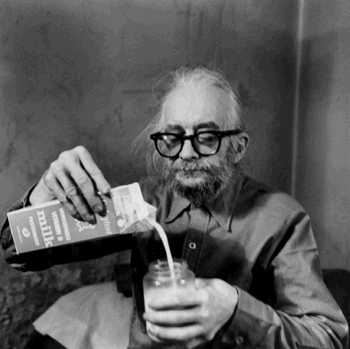“The great man responded simply that 'sometimes a cigar is just a cigar.' I don't really care if the story is true or not. Actually, I think I prefer that it be apocryphal, since made-up anecdotes have their own kind of truth. Still, it is equally true that just as cigars may be just cigars, so sometimes they are not. Same with meals in life and, of course, in literature. Sometimes a meal is just a meal, and eating with others is simply eating with others. More often than not, though, it's not.” Chapter Two: “Nice to Eat with You: Acts of Communion” page 7
This wasn't the first passage that I actually liked in How to Read Literature Like a Professor because of its comedic content, or because of the fact that the word “apocryphal” always makes me think of Andrew Bird, but because it was the first passage that actually had content. I remember distinctly lingering over this passage, reading it several times. “Made-up anecdotes have their own kind of truth.” Substance. When Harry Smith tells the world in all sincerity that he was raised by Aleister Crowley, that tells me more about him than when some over serious man forces him to relay his father's true identity. This is what Foster speaks of when he confronts the usage of previous texts and history in modern literature. That simple sentence concerning “made-up anecdotes” is why we are all reading this book. The uncertain, mysterious, deceitful, enshrouded quality of great anecdotes, folk tales, Shakespeare, the Bible, the Iliad, etcetera, holds true with all literature. There is the perception of truth. An author strives hard to create something that could be true, and perhaps is. This basis in truth, or the illusion of truth, allows readers to immerse themselves into the narrative, and discover more about an event, themselves, or life than reality could ever convey. The figurative language and dramatics of literature could never be fully absorbed in real life. Romeo and Juliet is supposedly based in truth, but Shakespeare rewrote a timeworn regional folk tale to create something that has become timeless, internationally renown, and tangible. Was all of womankind forged from the rib of a man along with a single breath? I severely doubt it but the imagery is moving enough to allow billions to believe it. Was the civil war of one of the greatest nations of all of human history fought because of jealously over women? Who knows? But Homer took the opportunity to take the fame of a tremendous event and translate it in terms of human emotion rather than politics. A few weeks after the story of the Holcomb killings was published in newspapers nationwide, all those who weren't directly affected or involved forgot of the tragic occurrence, until Capote blended truth with fiction to connect the world with Kansas. I can see a homeless man lying on a park bench, but when I am told who he is, whether the story is based in truth or not, my emotions are guaranteed to increase exponentially. Literature unites us all to events, emotions, and truths previously untapped. I can hear facts and statistics all day, but the pathos of literature was the only thing that honestly introduced me to the Civil War, or Jesus, or life in a gulag. This delicate balance of truth and man-made creation allow for greater comprehension when it comes to all things.

No comments:
Post a Comment